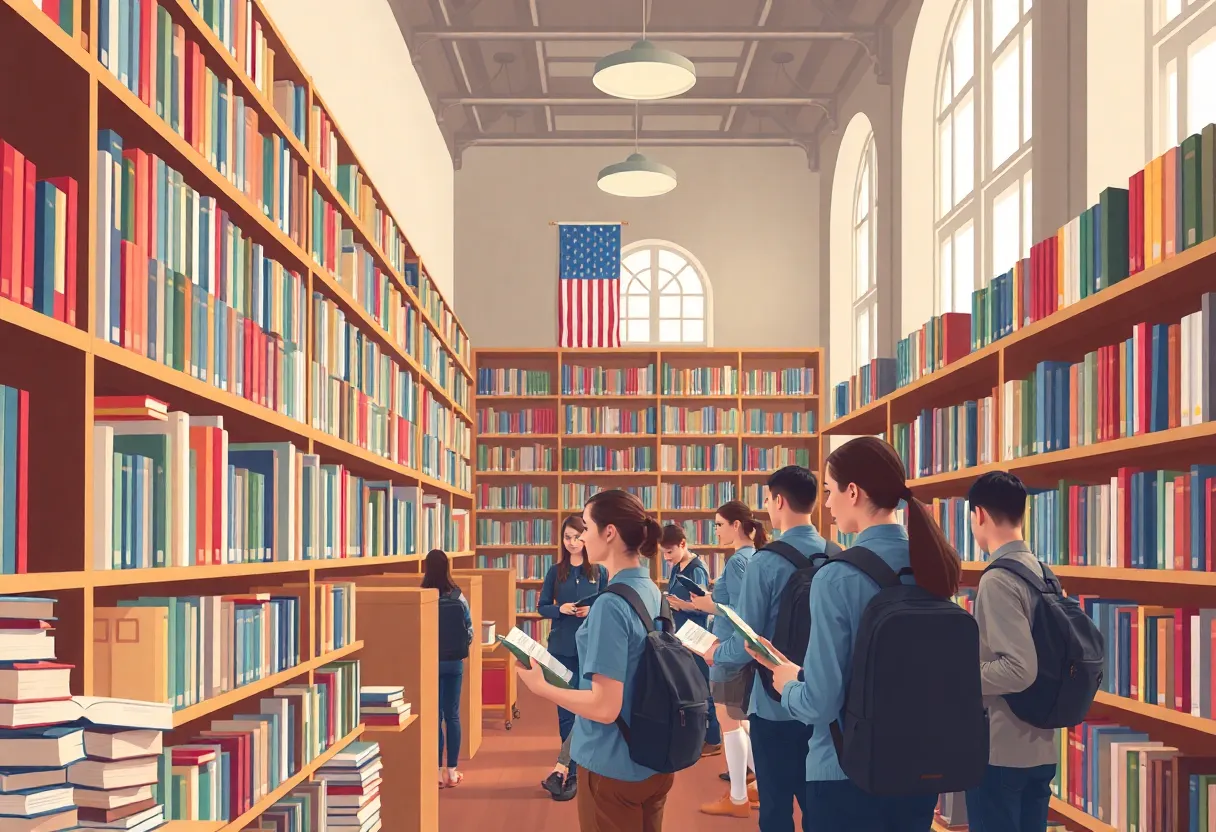Louisville, KY, October 21, 2025
A federal judge has mandated that a Northern Kentucky military academy must restore previously censored books in its library, citing violations of First Amendment rights. This decision follows a lawsuit initiated by parents and educators against the academy’s restrictions on content. Advocates in Louisville celebrate the ruling as a significant victory for intellectual freedom and access to diverse perspectives in educational settings, emphasizing the importance of free expression in schools.
Federal Judge Orders Restoration of Censored Books at Northern Kentucky Military Academy
Louisville, KY — A federal judge issued a ruling on October 21, 2025, requiring a Northern Kentucky military academy to restore censored books to its library, upholding First Amendment rights. This decision stems from a lawsuit filed by parents and educators challenging content restrictions in the school’s library.
The ruling emphasizes the protection of free expression in educational settings. The judge determined that the academy’s removal of certain books violated constitutional rights, marking a significant win for advocates of intellectual freedom. Local groups in Louisville have expressed support for the outcome, viewing it as an important step in ensuring access to diverse materials in schools.
Details of the lawsuit reveal that parents and educators argued the content restrictions limited students’ exposure to varied perspectives, potentially hindering their educational development. The case highlighted concerns over book selections that were deemed controversial by school officials, leading to their exclusion from the library. The federal court’s decision mandates the immediate reinstatement of these materials, aiming to restore balance in the academy’s resources.
Supporters in Louisville, including community organizations, have praised the ruling as a victory for free expression in schools. They believe it sets a precedent for other institutions facing similar challenges, reinforcing the idea that libraries should serve as open forums for ideas. This development comes amid ongoing discussions about curriculum and material choices across educational institutions.
Background on the issue shows that the lawsuit was initiated earlier this year when parents and educators noticed the removal of books covering topics such as history, social issues, and literature. The academy, located in Northern Kentucky, had implemented policies restricting certain content, citing reasons like appropriateness and sensitivity. Critics argued these actions suppressed free speech and limited access to information, prompting legal action.
The First Amendment plays a central role in this case, as it protects against government censorship and ensures the freedom of speech and expression. In the context of schools, this ruling underscores the need for institutions to uphold these principles while providing educational materials. The decision may influence how other schools approach book selections and censorship policies moving forward.
Local advocates in Louisville have been vocal about the importance of this ruling, noting that it aligns with broader efforts to promote inclusive education. They see it as a reminder that access to information is crucial for students’ growth and understanding of the world. This event highlights the ongoing tension between institutional oversight and individual rights in educational environments.
The restoration of the books is expected to occur promptly, with the academy required to comply with the court’s order. This outcome not only addresses the specific grievances raised in the lawsuit but also contributes to national conversations about censorship in schools. By prioritizing First Amendment rights, the ruling reinforces the value of diverse viewpoints in learning spaces.
Further context reveals that similar disputes have arisen in various parts of the country, where debates over book content have led to legal and community actions. In this instance, the federal judge’s decision provides clarity on the boundaries of censorship in educational settings, emphasizing the protection of students’ rights to access information. Louisville’s role in supporting the plaintiffs underscores the community’s commitment to educational freedom.
The case also sheds light on the processes involved in challenging content restrictions, including gathering support from parents, educators, and legal experts. This collective effort demonstrates how community involvement can lead to meaningful changes in school policies. As a result, the ruling serves as an example of how legal frameworks can safeguard free expression in everyday educational practices.
Overall, this development in Northern Kentucky, celebrated in Louisville, highlights the enduring importance of constitutional protections in schools. It encourages ongoing dialogue about the role of libraries in fostering open and inclusive environments for all students.
Supporting Details and Implications
In addition to the core ruling, the judge’s decision included guidelines for the academy to review its policies on book selections. This aspect aims to prevent future instances of censorship and promote a more balanced approach to library management. The involvement of local advocates in Louisville illustrates the wider impact of the case, as it resonates with efforts to maintain intellectual freedom across the region.
The lawsuit’s progression involved key arguments from both sides, with plaintiffs emphasizing the educational harm caused by restrictions. Evidence presented likely included examples of the censored books and their relevance to the curriculum. The federal court’s affirmation of the plaintiffs’ claims reinforces the legal standards for free speech in public institutions.
Moving forward, schools may need to reassess their material policies in light of this ruling. The outcome could lead to increased scrutiny of content decisions, ensuring they align with constitutional principles. This case adds to a series of similar events, where communities have rallied to protect access to information in educational settings.
FAQ
- What was the federal judge’s ruling? A federal judge ruled that a Northern Kentucky military academy must restore censored books to its library, upholding First Amendment rights.
- What prompted the lawsuit? The decision follows a lawsuit by parents and educators against content restrictions.
- How have local advocates responded? Local advocates in Louisville praise the outcome as a victory for free expression in schools.
- What does this mean for First Amendment rights? The ruling upholds First Amendment rights by requiring the restoration of censored books.
Key Features Chart
| Feature | Description |
|---|---|
| Ruling Outcome | A federal judge ruled that a Northern Kentucky military academy must restore censored books to its library, upholding First Amendment rights. |
| Lawsuit Details | The decision follows a lawsuit by parents and educators against content restrictions. |
| Local Response | Local advocates in Louisville praise the outcome as a victory for free expression in schools. |
| Key Impact | Reinforces protection of free expression in educational settings. |





